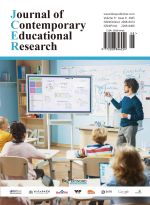AI-Generated Content Tools and Chain of Thought: Revolutionizing Pragmatics and Translation Education for MTI Students
Abstract
This conceptual study proposes a pedagogical framework that integrates Generative Artificial Intelligence tools (AIGC) and Chain-of-Thought (CoT) reasoning, grounded in the cognitive apprenticeship model, for the Pragmatics and Translation course within Master of Translation and Interpreting (MTI) programs. A key feature involves CoT reasoning exercises, which require students to articulate their step-by-step translation reasoning. This explicates cognitive processes, enhances pragmatic awareness, translation strategy development, and critical reflection on linguistic choices and context. Hypothetical activities exemplify its application, including comparative analysis of AI and human translations to examine pragmatic nuances, and guided exercises where students analyze or critique the reasoning traces generated by Large Language Models (LLMs). Ethically grounded, the framework positions AI as a supportive tool, thereby ensuring human translators retain the central decision-making role and promoting critical evaluation of machine-generated suggestions. Potential challenges, such as AI biases, ethical concerns, and overreliance, are addressed through strategies including bias-awareness discussions, rigorous accuracy verification, and a strong emphasis on human accountability. Future research will involve piloting the framework to empirically evaluate its impact on learners’ pragmatic competence and translation skills, followed by iterative refinements to advance evidence-based translation pedagogy.
References
Hu K, Li J, 2024, Translation Talent Cultivation in the Context of Large Language Models: Challenges and Prospects. Foreign Language World (Computer-Assisted Foreign Language Education in China), 2024(6): 3–7 + 105.
Nida E, 1964, Toward a Science of Translating: With Special Reference to Principles and Procedures Involved in Bible Translating. Brill Archive, Netherlands.
Collins A, Brown J, Holum A, 1991, Cognitive Apprenticeship: Making Thinking Visible. American Educator, 15(3): 6–11.
Ostovar-Namaghi S, Moghaddam M, Veysmorady K, 2024, Empowering EFL Learners Through Cognitive Apprenticeship: A Pathway to Success in IELTS Speaking Proficiency. Language Teaching Research, 2024: 13621688241227896.
Abdulwahhab I, 2024, Enhancing Translation Competence: Investigating Summarization Impact on English/French to Arabic Translation. Arab World English Journal, 15(1): 132–143.
Wei J, et al., 2022, Chain-of-Thought Prompting Elicits Reasoning in Large Language Models. Advances in Neural Information Processing Systems, 35: 24824–24837.
Wang J, Meng F, Liang Y, et al., 2024, DRT: Deep Reasoning Translation via Long Chain-of-Thought. arXiv preprint arXiv:2412.17498.
Zhang X, Du C, Pang T, et al., 2024, Chain of Preference Optimization: Improving Chain-of-Thought Reasoning in LLMs. Advances in Neural Information Processing Systems, 37: 333–356.
Nguyen L, Xu Y, 2025, Reasoning for Translation: Comparative Analysis of Chain-of-Thought and Tree-of-Thought Prompting for LLM Translation. ACL 2025 Student Research Workshop.
Li J, Zhu S, Yang H H, et al., 2024, What Does Artificial Intelligence Generated Content Bring to Teaching and Learning? A Literature Review on AIGC in Education. 2024 International Symposium on Educational Technology (ISET), IEEE: 18–23.
Zhong H, 2023, Opportunities and Challenges Brought by Generative Artificial Intelligence to Translation Practice. Beijing Translation, 2.
Zhang H, 2024, Innovation of STEM Education Concept in the Cultivation of Translation Professionals Under the Background of AIGC. Roundtable.

